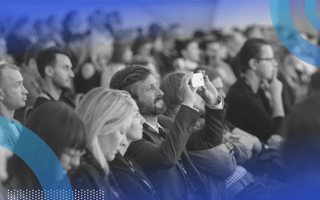In a group setting, businesses take advantage of the opportunity to gain new leads and interact with potential customers. While event marketing has centered around in-person conferences and activities, it can also include gatherings created for virtual platforms and other online environments.
What are the essential features of event marketing?
- Successful event marketing campaigns will promote the event through multiple channels beforehand, hold a clear objective during the event, and follow up with post-event conversations.
Following the principles of typical marketing campaigns, event marketers reach out to people with a multi-channel strategy. Flyers, emails and websites are all effective forms of communication, depending on where target audience members spend their time. Social media has increasingly become a popular format to share event information, which should include the type of event that attendees can expect. At the culmination of each event, marketers will subsequently reach out to attendees to gauge responses and nurture relationships with potential customers.
The realities of the COVID-19 pandemic has resulted in event marketers implementing many changes to the scheduling and itinerary of events in recent years while still maintaining a crucial element of excitement and energy. An emphasis on safety and well-being at in-person activities has led to health protocols being adapted at many events, such as sizing, social distance, masking, vaccination and temperature checking requirements. Several formerly in-person events have also transformed into virtual or hybrid events with a mixture of present and remote presenters and attendees.
What are the advantages of event marketing?
- People remember experiences more than advertisements, so event marketing can contribute to stronger customer relationships.
Many companies turn to advertisements to pursue people’s attention, but potential buyers have learned to block out this noise. Events provide a much more intimate setting where organizations can showcase their values, leadership, talent and mission statements. Exposure to these details allows audiences to develop closer connections with businesses and enjoy more authentic marketing experiences.
Although convincing people to attend an event requires plenty of resources, the process has become simplified in the digital age. Livestreaming events lets attendees stay at home while enabling companies to target larger and more spread-out audiences. With the capacity to provide more personalized interactions for in-person and virtual attendees, event marketing becomes a potent tool for expanding a customer base.
How do I get into event marketing?
Those looking to enter the event marketing field have various options for gaining experience and cultivating the necessary skills.
There are many opportunities to gain firsthand experience in event marketing. For someone thinking about a career change, a great way to get your feet wet in event marketing is to help with functions at your current company, such as a recruitment event. If you’re new in the job market, many businesses look for interns to organize and help run events, especially around major holidays.
Getting down to the specifics, above all else, event planners need to be organized. In addition to basic communication, planning, and coordination skills, it will serve event marketers well to have knowledge of marketing platforms and how to conduct audience research. Using content management platforms to develop content calendars enables marketers to plot out when and where to target their audiences. These technical skills are also valuable when it comes to the rise of virtual events. With a well-rounded background, professionals can position themselves for a promising career in event marketing.





